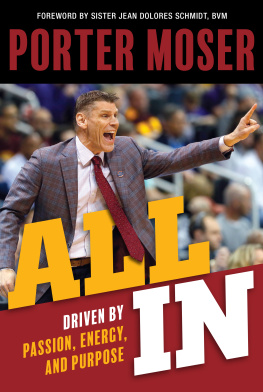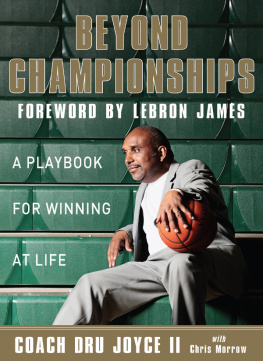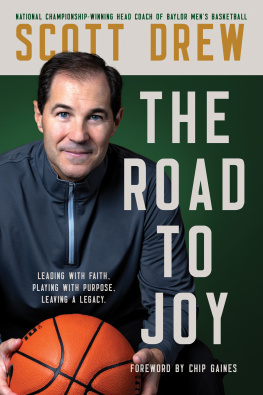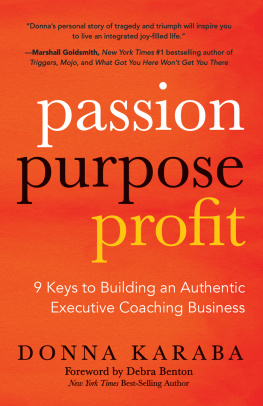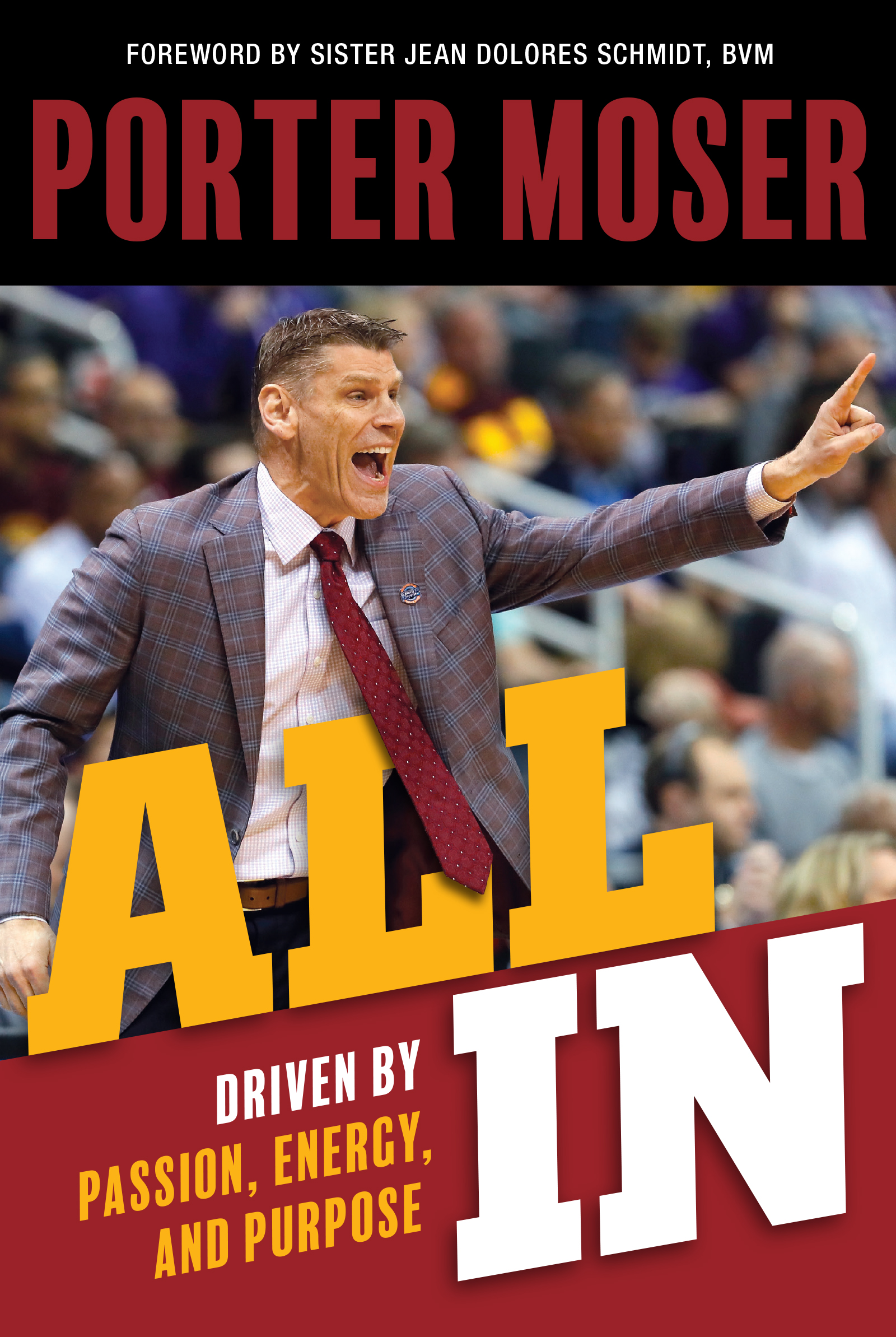
3441 N. Ashland Avenue
Chicago, Illinois 60657
(800) 621-1008
www.loyolapress.com
2020 Porter Moser
All rights reserved.
Cover art credit: Kevin C. Cox/Getty Images Sport/Getty Images.
eBook ISBN: 978-0-8294-5002-6
Based on the print edition: 978-0-8294-5001-9
Library of Congress Control Number: 2019954729
19 20 21 22 23 EPUB 5 4 3 2 1
To my parents, Jim and Sandy: thank you for providing me with a childhood of love, life lessons, and the positive belief that I could accomplish anything with faith, energy, and passion.
I am Sister Jean Dolores Schmidt, a Sister of Charity of the Blessed Virgin Mary, whose motherhouse is in Dubuque, Iowa. Most people know me simply as Sister Jean. I have been the chaplain for the Loyola Ramblers mens basketball team for more than twenty years, since 1994. When the team advanced to the NCAA Final Four in 2018, the coach who wrote this book, Porter Moser, his team, and I became a bit famous.
The Final Four win might be the reason you picked up this book. Youll learn a lot about basketball, recruitment, and strategy. Youll learn a lot more about life skills. I call Porter a man for all seasons because his impact on the team and students continues throughout the year as well as throughout their lives.
Having been Jesuit educated at Creighton University in Omaha, Nebraska, Porter is truly a person for others. His faith in God and his religious experience are evidenced in his personal life with his family as well as with his team. Porter encourages values based on leadership, global awareness, and service based on social justice.
These Jesuit values are part of his life as one views him at basketball practices and games; his passion for the sport; his teaching skills with the team on and off the court; his local lectures; and his dealings with coaches of the various teams at Loyola University. Porters special ability to recruit the right young man for the right Rambler position is exceptional.
His goodness is so sincere that it captivated me immediately when he came here to coach the team. His whole healthy attitude toward sports has to do with things beyond playing on the court. Not only does he know the values of a Jesuit education, he also practices them, and they rub off on the team. Theyre really good kids. I think our other teams have improved, too, partly from his good influence on our Loyola spirit.
Porter is interested in each individual, helping all with any difficulties they have. He also teaches them to be generous; they share the ball. They dont care who makes the basket as long as the ball goes through the hoop. You can tell when a team does not live by that. Hes taught them to be friends with one another and with him. He brings a prayerful attitude as well. We pray before each game. I have to say, sometimes my prayers arent holyIm asking for a win all the time. Porters not afraid to talk about God. One of our slogans is Worship, Work, and Win and we have to do all those things. Those words are up in the weight room as well, so the students see them all the time.
Hes a good father, and that has a lot to do with his work with the team. When a young man makes a mistake on the court, Porter talks to him right away; theres no punitive quality to it. The young man sits down, then pretty soon, Porter puts him back on the floor. If a player does something really spectacular, Porter lets him come off the court and take a little rest, but before he sits down, he commends him. Then he goes out on the court again. Everybody sees that.
The entire student body recognizes him as a friend. After games, you hear, Porter, Porter! After they congratulate the opposing team, he and the team go around the whole arena and thank the Pep Band, the Spirit Teams, and the student fans for their attendance. The students wait for thatthey dont even leave. Theyre grateful for that. So many of the students are excited about Loyola sports. The Final Four had such an effect on themit happened before final exams. I was asking students, How come everyone is so happy before finals? They answered, Sister Jeanthe Final Four!
Porters the boss and a great man to work with. He tolerates some of the things I do. He never says, Dont do that, Sister Jean, such as when I do my scouting reportbut I know that Im on the same page as he is. People ask me, Sister Jean, do you pray during games? and I say, You better believe it!
I hope other coaches will take this book to heart. I think a lot of other people will want to read it as well, especially if theyre involved in basketball. I think high school coaches will read it. Athletes will read thisall kinds of athletes. This is easy reading, but its deep. Porter writes it that way because it comes from his heart.
Enjoy Porters style, his honesty, and his integrity as he describes his personal experiences as an undergraduate basketball player at Creighton University; how he overcame his sense of failure, how in his professional life perseverance, failure, adversity, passion, humility, enthusiasm, and energy played such important roles.
And, yes, the culture that he and his Final Four team of 2018 created is one to be admired. His young men learned more than basketball skills: they learned lifelong skills and are continuing to practice them and teach them to others. If you want to see a coach dedicated to his team and to his passion for basketball, just come to Chicago and attend a mens basketball game in our Gentile Arena.
I often think of the time I had to tell my then-eight-year-old daughter Jordan that I was no longer going to be the coach of the Illinois State Redbirds. I think about the look on her face, about how her face started to crumble and her eyes teared up. I think about the pit in my stomach. Telling my family that I had been fired was the worst day of my professional life. But what I now think about most from that day is how I responded to that fact and the feeling it gave me. I wasnt going to let failure define who I was as a person. That failure led me into what I call competitive reinvention, in which I used my energy, my positivity, and my passion to find a way to succeed.
There are a lot of different ways to define success. You can be successful when you achieve certain professional or personal goalsthat might mean getting a scholarship to play basketball at a Division I school or winning a conference title. For someone else, success might mean landing that dream job right out of school. And for yet another person, success might mean having a great family and a deep faith. Ive measured success in all these ways at one point or another in my life. I played Division I basketball at Creighton University, where we won the Missouri Valley Conference. I have a dream job coaching collegiate basketball at Loyola University Chicago, and our team went to the Final Four of the NCAA Tournament in 2018. I have a great family, a wonderful wife, and terrific kids. And I try to be the best man of God that I can be by living a faith-filled life that I hope gives glory to God.
But when I reflect on my successes, I cant help but recognize the hardships I had to overcome to achieve them. Success doesnt come easily. You have to be driven by something. You must have an energy about yourself that motivates you to overcome obstacles. That energy can come from a vision you have about who youor what your futurecould be. That energy can come from your faith, beliefs, or values. Whatever it is, that source of energy is what drives you to respond to adversity with positivity.

